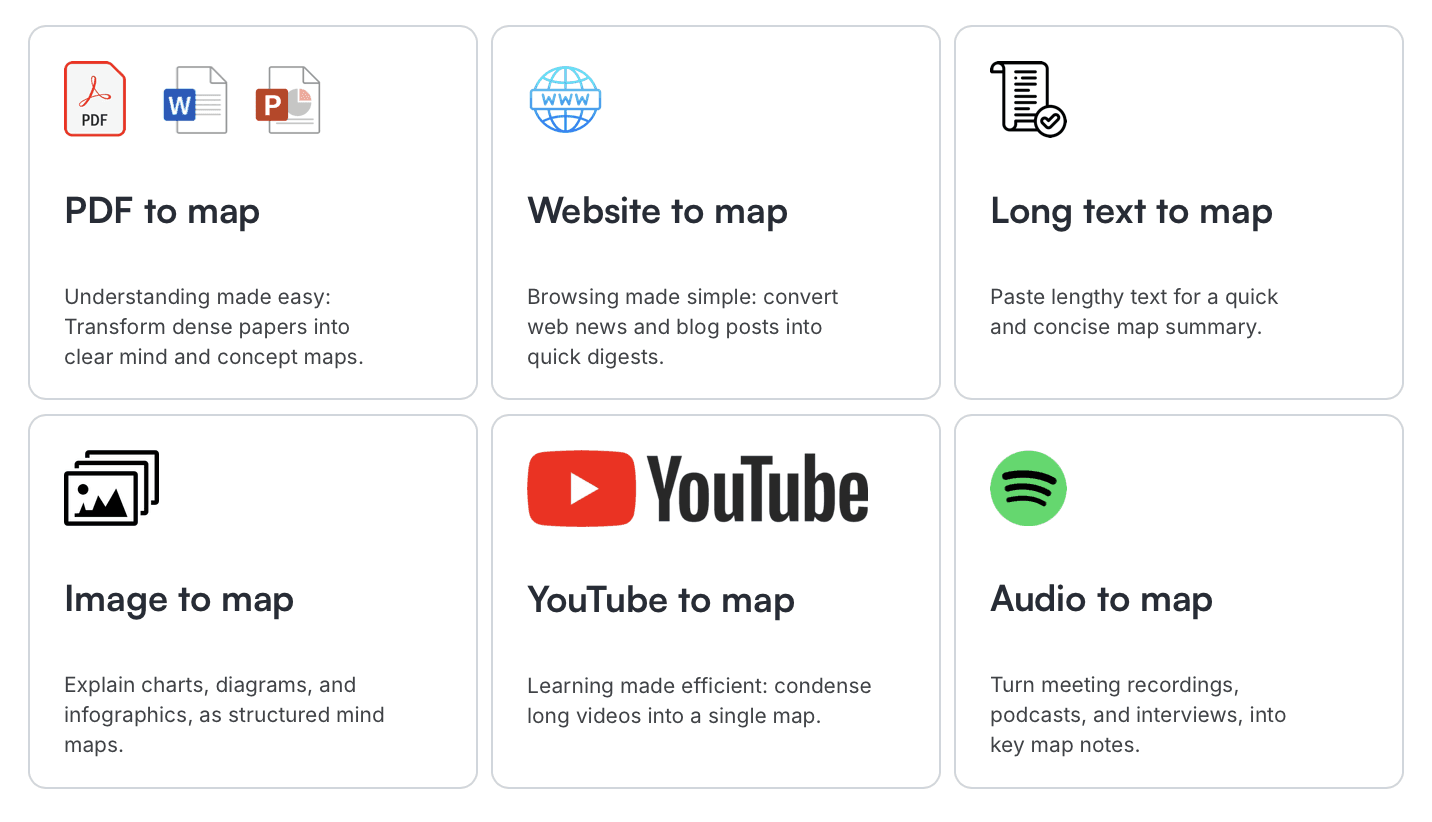AI-Powered Study Guides: How Students Can Use The Visualizer for Exam Preparation
Sep 25, 2024

When exam season arrives, students often feel overwhelmed by the volume of information they need to review. Traditional study methods, like re-reading notes or creating flashcards, can be time-consuming and inefficient. But what if there was a faster, smarter way to organize and review study material?
Enter The Visualizer, an AI-driven tool that can generate detailed mind maps and concept maps from your lecture notes, textbooks, PDFs, or even YouTube video tutorials. With its ability to break down complex topics into structured visual representations, The Visualizer helps students study smarter, not harder.
How Mind Maps Help with Learning
Mind maps are an effective study tool because they align with how our brains naturally process and store information. By visually organizing knowledge into nodes and branches, mind maps make it easier to grasp relationships between different ideas, aiding both comprehension and retention.
Studies have shown that mind mapping can improve memory and understanding of complex subjects:
• A 2002 study by Farrand, Hussain, and Hennessy found that participants who used mind maps retained 10% more information than those who used traditional note-taking methods .
• Buzan’s theory of “radiant thinking” posits that the brain organizes ideas in a similar, non-linear manner, making mind maps a natural fit for understanding complex topics .
• Research has shown that students using mind maps for exam prep experienced a significant boost in creative problem solving and were able to synthesize information more effectively .
AI-Generated Mind Maps for Efficient Exam Prep
The Visualizer takes traditional mind mapping to the next level by using AI to automate the process. Instead of manually creating mind maps, students can upload documents (such as lecture slides, textbook PDFs, or personal notes), and the AI will instantly generate a mind map that highlights key concepts and their relationships.
Here are a few ways students can leverage The Visualizer for exam preparation:
• Organize Study Material: Upload your textbook chapters or lecture notes, and The Visualizer will automatically organize the material into a clear, easy-to-follow mind map, breaking down complex topics into manageable subtopics.
• Summarize YouTube Tutorials: If you prefer video-based learning, you can summarize educational YouTube videos with The Visualizer. The tool will extract key points and structure them into a mind map, making it easier to review important concepts.
• Track Learning Progress: Use the mind maps to check your understanding of a topic. Each node on the map can serve as a prompt, encouraging active recall, one of the most effective study techniques for memory consolidation.
• Simplify Complex Theories: The Visualizer is excellent at distilling intricate topics (like biology, physics, or philosophy) into more digestible forms. This helps students quickly understand core principles and their applications.
Why This Works: The Science Behind Mind Maps and AI in Education
The benefits of using AI-generated mind maps for studying are backed by research in both cognitive psychology and educational technology. Here’s why The Visualizer is a game-changer for exam prep:
1. Active Learning: Active recall and spaced repetition are proven methods for enhancing retention. Mind maps encourage students to engage with the material through a visual, non-linear format, making it easier to apply these techniques .
2. Cognitive Load Reduction: By breaking down information into bite-sized pieces, mind maps reduce cognitive load. This frees up working memory, allowing students to focus on higher-order thinking rather than rote memorization .
3. Visual Learning: According to the Dual Coding Theory (Paivio, 1990), combining words and visuals can boost learning by engaging both verbal and visual processing centers of the brain . Mind maps are an excellent example of dual coding, helping students form deeper connections between concepts.
4. AI-Assisted Study: AI tools like The Visualizer not only save time but also provide students with access to personalized learning experiences. The AI adjusts to different input formats (PDFs, YouTube videos, etc.), ensuring that students can study from diverse resources while maintaining a consistent study framework .
How to Get Started with The Visualizer for Exam Prep
Using The Visualizer to prep for your next exam is easy:
1. Upload your study material: Whether it’s a PDF of your notes, a video link from YouTube, or text from an online resource, simply upload it to The Visualizer.
2. Generate your mind map: The AI will analyze your input and create a comprehensive mind map outlining the key points, concepts, and relationships between them.
3. Use it to study: Review the mind map, test your understanding, and refine it further by adding your own notes or links to relevant resources.
With The Visualizer, students can tackle exam prep with confidence and clarity, knowing they are studying in a way that’s scientifically proven to work.
References
1. Farrand, P., Hussain, F., & Hennessy, E. (2002). The efficacy of the ‘mind map’ study technique. Medical Education, 36(5), 426-431.
2. Buzan, T. (2006). The Mind Map Book: Unlock your creativity, boost your memory, change your life. BBC Active.
3. Nesbit, J. C., & Adesope, O. O. (2006). Learning with concept and knowledge maps: A meta-analysis. Review of Educational Research, 76(3), 413-448.
4. Karpicke, J. D., & Blunt, J. R. (2011). Retrieval practice produces more learning than elaborative studying with concept mapping. Science, 331(6018), 772-775.
5. Roediger, H. L., & Butler, A. C. (2011). The critical role of retrieval practice in long-term retention. Trends in Cognitive Sciences, 15(1), 20-27.
6. Sweller, J. (1988). Cognitive load during problem solving: Effects on learning. Cognitive Science, 12(2), 257-285.
7. Paivio, A. (1990). Mental representations: A dual coding approach. Oxford University Press.
8. Luckin, R., Holmes, W., Griffiths, M., & Forcier, L. B. (2016). Intelligence unleashed: An argument for AI in education. Pearson.